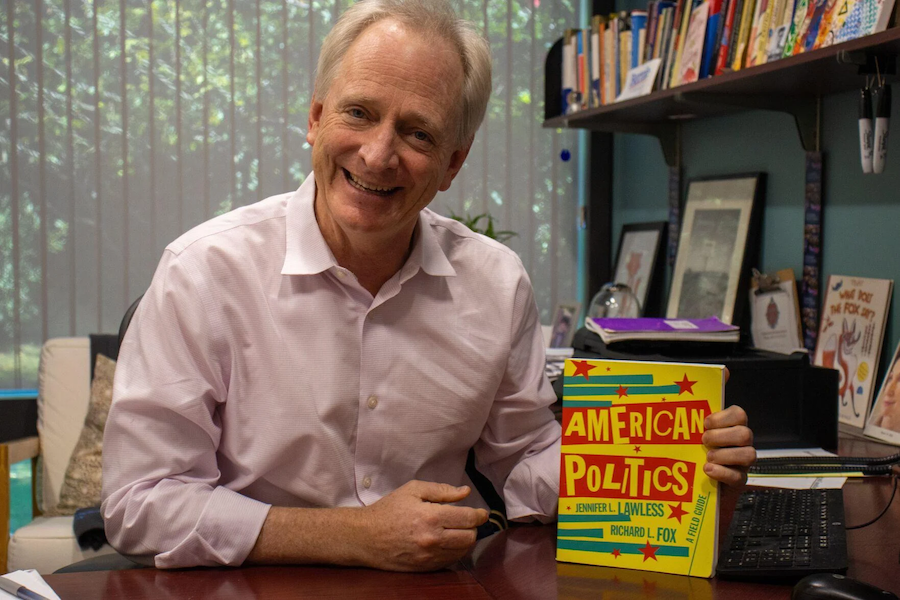
Richard Fox knows firsthand the value and meaning of a liberal arts education. He graduated from Claremont McKenna College, taught political science for 13 years at Union College in Schenectady, New York, and has been a faculty member in the LMU Bellarmine College of Liberal Arts (BCLA) since 2007 where he has also served as associate chair and chair of Political Science and International Relations, and as associate dean of undergraduate education. As associate dean, Fox worked to implement consequential changes in the College, including the launch of the BCLA Advising Center, the four-unit curriculum, and new academic programs of study.
After a national search, it was announced in October of 2023 that Fox will be BCLA’s next dean. He will assume the position in June of this year. While he acknowledges that it is a turbulent time for higher education in general and the liberal arts in particular, he looks forward to providing students with a well-rounded educational experience and the skills, knowledge, and perspective needed to find their purpose and their way in an increasingly complicated world.
In this Q&A, Fox shares his views about the liberal arts and what he looks forward to as dean.
What inspired you to shift from faculty scholar and beloved teacher to BCLA’s academic leader?
I don’t know about beloved! It has taken a long time for me to accept the idea that I could be an academic leader. As I’ve held leadership positions in the College, I’ve realized that I enjoy problem-solving. I’ve become dedicated to or even obsessed with thinking about achieving higher levels of academic excellence in BCLA. Nonetheless, as dean, I will always stay deeply grounded in my experience as a teacher-scholar.
It was announced in October 2023 that you will become dean in June 2024. How are you using this time to prepare for the role?
I will be doing my best to engage with all the academic departments this spring, to listen to faculty, and to hear what is on their minds. I always ask my students what sorts of things we might do to improve their academic experience, and will continue those conversations. I am also meeting with people across the college and the university, learning more about them and their roles, and hearing lots of constructive suggestions, all in a concerted effort to fully prepare myself to start the role. In other words, a lot of lunches! If you want to have lunch sometime this semester to share your ideas for improving our college, please get in touch. Lunch will be on me!
What excites you most about being dean?
I am excited to build on our existing strengths and by working to improve the academic experience for our students and faculty. More specifically, I feel energized by the opportunity to advocate for the liberal arts, and particularly the humanities, to develop new interdisciplinary programs of study, to raise funds to support faculty and student endeavors, and to strengthen our sense of community in BCLA. I am committed to cultivating the conditions for us all to thrive or at least die trying.
What makes BCLA and LMU special?
We are a university in a vibrant and exciting city, with faculty who are talented, diverse, and devoted to our students. Through their teaching, research, and other scholarly and professional endeavors, they demonstrate the enduring relevance of the liberal arts and prepare our students to meet the current moment with compassion, curiosity, and creativity. Our Jesuit and Ignatian values, such as working for the common good and for justice and truth, can be seen in so much of what we do. For all these reasons, we have the potential to offer a truly exceptional educational experience.
What challenges do you hope to tackle, and what are our greatest opportunities?
Higher education, especially the liberal arts, faces many challenges – decreasing public support, increased costs, over-reliance on part-time faculty, and corporatization, to name a few. But our college and university, in the dynamic and diverse city of Los Angeles, can continue to be a place that cherishes and values a humanities-based approach to understanding the world. Our challenge and opportunity are to think of creative and enticing ways to engage our students and convince the broader public that now, more than ever, we need a place like BCLA in the world.
Why is liberal arts education so important, especially in today’s world and for the future?
A liberal arts education, a broad education that asks students to ponder and reflect on the big questions of life and existence, has never been more critical than today. The world feels like an increasingly complicated place with deep political and social divisions, shifting global power dynamics, and dramatic technological changes – so more than ever; we need to provide students with the skills, knowledge, and perspective to navigate this world.
How do you plan to stay connected to students, and what’s your favorite piece of advice to share with them?
I want to be a truly student-centered dean. I will initiate a Dean’s Student Advisory Board – a group of 8-10 students – that I will meet with regularly to provide a space for the student voice to be heard and to keep me connected to the student experience. In terms of advice to students – go to class, read, and seek out your professors!



